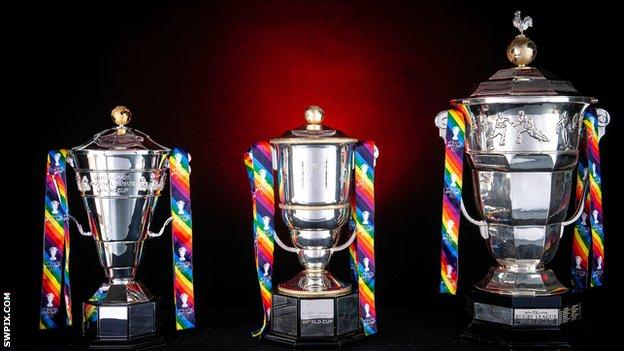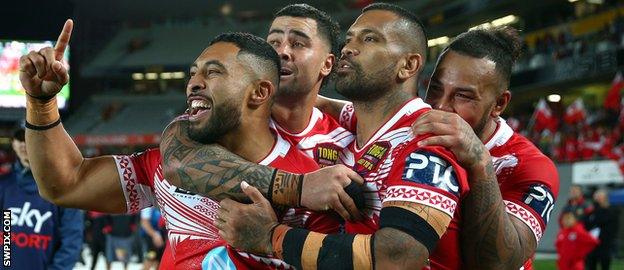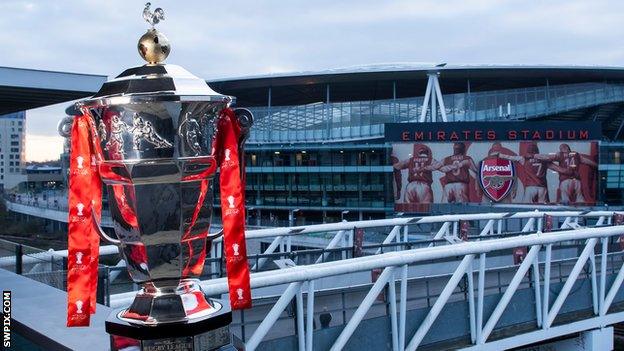Rugby League World Cup organisers remain positive for 2021 schedule despite Covid-19 issues
- Published

For the first time all three World Cups - men's, women's and wheelchair - run simultaneously in 2021
Rugby league's World Cup 2021 organisers are optimistic that the tournament will be staged at the end of this year as planned.
However, they have given themselves a cut-off point of May before a final decision is taken on what form the tournament will take - with full stadiums or reduced, socially distanced crowds - or whether it will have to be postponed until 2022.
This is the biggest and most connected tournament ever planned, with the men's, women's and wheelchair tournaments all running simultaneously - and a double-header final at Old Trafford also introduced for this event.
"I firmly think that as of today we can deliver the tournament this year," RLWC2021 chief executive Jon Dutton told BBC Sport.
"Can we deliver it the way we want to with full stadia? I don't think we can answer that question just yet.
"I think staging the tournament this year is the more palatable option, but we have to be both realistic and act in the best interest of the International game. And, if 2022 is what we have to do, then we'll do it as well as we can."
Two critical deadlines

There is excitement about seeing teams like Tonga - an emerging force in rugby league - and whether they can upset the established order of rugby league's 'big three'
The tournament faces two critical deadlines before any decision is made. Organisers will make an initial assessment in March, but a final decision is more likely to be made in May.
"The decision will be based on the environment and based on whether we can get the athletes into the UK safely and making sure we can get as many people to stadia as possible," said Dutton.
"Should that unequivocally not be the case, then of course we'll have to look at postponement.
"If in March we need more time to monitor the situation, we have the ability. So I think March is the first point when we might make a decision, but we have the rest of spring then to just make sure we're being calm, we're rational and we're making a decision in the best interests of the sport," he added.
"There isn't a drop-dead date when we're going to make a cast-iron decision, but we are being really agile, similar to the men's Uefa European Championship and the considerations for the Olympic Games. The advantage for us is that we have much more time than either of those two events.
"We are still very optimistic, but that's tempered with being realistic with the challenges we face."
How can the competition cope with potential revenue decrease?

Organisers have secured some high-level stadiums for the tournament, such as Arsenal's Emirates Stadium which will host a semi-final
If the World Cup had to be played in front of half-empty stadiums, organisers might turn to the government to help cover some of the lost income.
Central government has already provided £15m towards the costs of staging the tournament, with up to £10m more to fund legacy projects in the community.
"There is concern about the budget if we couldn't run the tournament in front of full stadia," said Dutton.
"We've always been pretty clear that about 90% of our revenue is from ticket sales and from our government funding. If we got into a position where we could run a tournament but the capacity was radically reduced, then there is more reliance on our government funding partners to meet any deficit and that's obviously a conversation we've been having for some time.
"This tournament is like never before in terms of the level of government funding, but what that brings is an enormous amount of scrutiny, quite rightly.
"Yesterday Culture Secretary Oliver Dowden tweeted about the World Cup. Before Christmas he spoke in Parliament that he hoped that this would be the first event in the UK back in front of full stadia.
"Nigel Huddleston, Sports Minister, has talked very positively about the tournament. So government support is there and there is the government's levelling-up agenda and the importance of this for the north of England.
"The reliance on government and their input into decision making is critical."
Worst-case scenarios for RLWC 2021
Postponing the tournament for 12 months would be a very last resort for the organisers. Moving the World Cup to 2022 would mean ripping up most of the plans and starting again and that would create a huge challenge.
"It's significant," said Dutton. "We have 21 venues, we have 32 teams, we have 18 host towns and cities and we have commercial partners. The dates are very challenging too.
"If we moved the tournament back exactly 12 months, there would be a clash with the last week of our tournament and the first week of the Fifa World Cup in Qatar, and that to me seems wholly unpalatable.
"That would prompt some further thinking and discussions both with Super League and the NRL in terms of their seasons. So postponement, yes we have a plan but it isn't an option that fills me with much excitement at the moment.
"Time is still on our side. We are in such a good place.
"Our ticket sales in 2020 massively exceeded our expectations, we're financially stable, so the foundation is built. We need the environment to change the way we hope."

Remembering an icon: Here how David Bowie always managed to stay ahead of his time
Need a lift?: Joe Wicks and guests are here to bring positivity to your day

